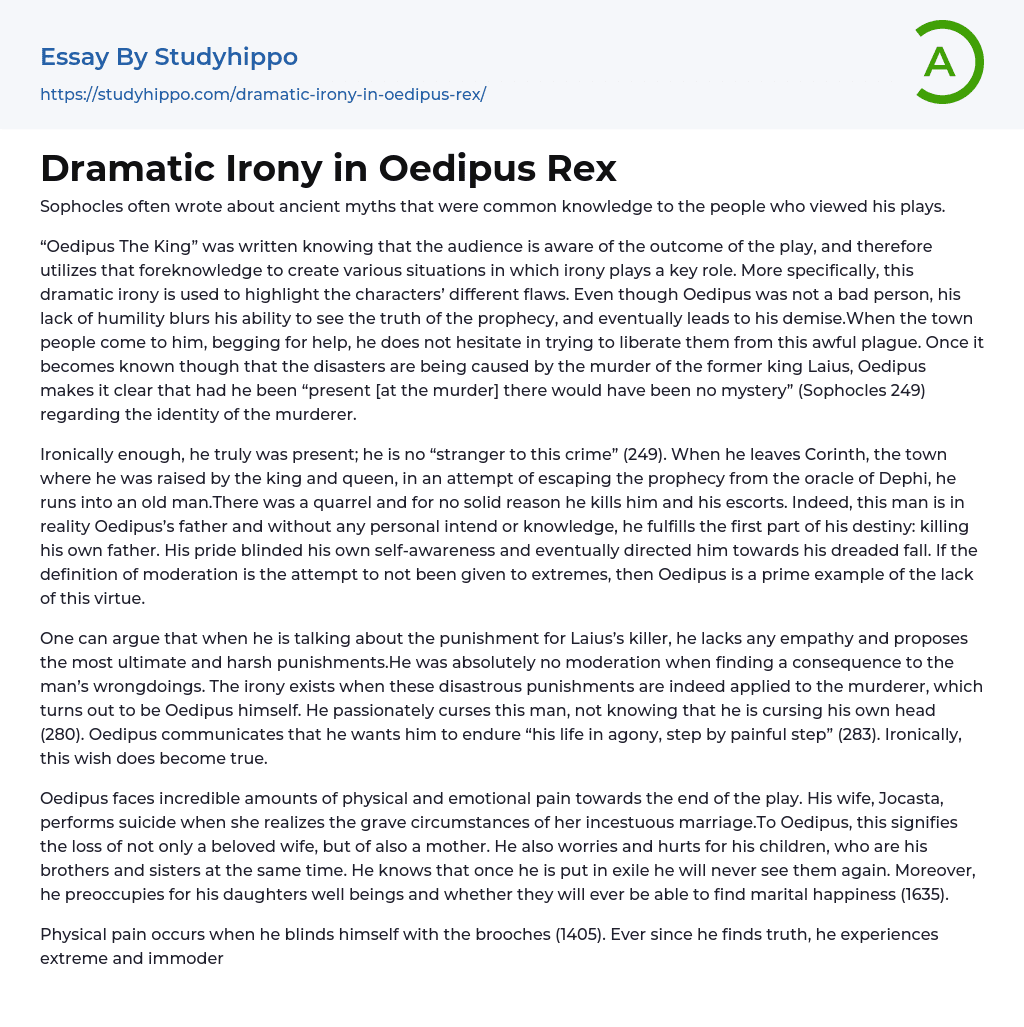Sophocles often wrote about ancient myths that were common knowledge to the people who viewed his plays.
“Oedipus The King” was written knowing that the audience is aware of the outcome of the play, and therefore utilizes that foreknowledge to create various situations in which irony plays a key role. More specifically, this dramatic irony is used to highlight the characters’ different flaws. Even though Oedipus was not a bad person, his lack of humility blurs his ability to see the truth of the prophecy, and eventually leads to his demise.When the town people come to him, begging for help, he does not hesitate in trying to liberate them from this awful plague. Once it becomes known though that the disasters are being caused by the murder of the former king Laius, Oedipus makes it cle
...ar that had he been “present [at the murder] there would have been no mystery” (Sophocles 249) regarding the identity of the murderer.
Ironically enough, he truly was present; he is no “stranger to this crime” (249). When he leaves Corinth, the town where he was raised by the king and queen, in an attempt of escaping the prophecy from the oracle of Dephi, he runs into an old man.There was a quarrel and for no solid reason he kills him and his escorts. Indeed, this man is in reality Oedipus’s father and without any personal intend or knowledge, he fulfills the first part of his destiny: killing his own father. His pride blinded his own self-awareness and eventually directed him towards his dreaded fall. If the definition of moderation is the attempt to not been given to extremes, then
Oedipus is a prime example of the lack of this virtue.
One can argue that when he is talking about the punishment for Laius’s killer, he lacks any empathy and proposes the most ultimate and harsh punishments.He was absolutely no moderation when finding a consequence to the man’s wrongdoings. The irony exists when these disastrous punishments are indeed applied to the murderer, which turns out to be Oedipus himself. He passionately curses this man, not knowing that he is cursing his own head (280). Oedipus communicates that he wants him to endure “his life in agony, step by painful step” (283). Ironically, this wish does become true.
Oedipus faces incredible amounts of physical and emotional pain towards the end of the play. His wife, Jocasta, performs suicide when she realizes the grave circumstances of her incestuous marriage.To Oedipus, this signifies the loss of not only a beloved wife, but of also a mother. He also worries and hurts for his children, who are his brothers and sisters at the same time. He knows that once he is put in exile he will never see them again. Moreover, he preoccupies for his daughters well beings and whether they will ever be able to find marital happiness (1635).
Physical pain occurs when he blinds himself with the brooches (1405). Ever since he finds truth, he experiences extreme and immoderate pain over and over.Jocasta’s lack of reverence to the gods also leads her to a painful ending. After Oedipus informs her of what the prophet Tiresias had told him, he doubts the authority of such a comment. She advices him not to worry because prophecies do not come
true (779). Jacosta is a firm believer that man should fear nothing, that “it’s all chance” (1069).
In order to convince Oedipus, she proceeds to tell him the prophecy that she and her husband received, about the son who would kill his father and marry his mother. She informs him that the baby was left in a mountain to die.What Jacosta fails to realize is that the man that she’s talking to, his husband Oedipus, is certainly this baby that was left for dead. She didn’t respect the gods’ power, and they proved to her that not all happens for luck. Prophecies exist for a reason. Sophocles tackles the argument between man’s free will and the decision of the gods.
In an attempt to inculcate the importance of certain virtues and principles to the people of ancient Greece, he tells the story of Oedipus, and how his lack of the ‘primary unities’ eventually led him to fail as a king, as a husband and as a man.Sophocles achieves these moral teachings with his use of irony, which not only showcases the lack of these virtues, gives the characters more depth, and provides for comical relief, but it also foreshadows the resolution, giving the audience an advantage over the characters’ knowledge. Working Bibliography Sophocles. Oedipus The King.
Trans. Robert Fagles. Literature: An Introduction to Fiction, poetry, and Drama. Custom Interactive Edition for Blinn College. Ed.
X. J. Kennedy and Dana Gioia. 9th ed.
New York: Longman, 2005. 1365-1433.
- Allegory essays
- Alliteration essays
- Comedy essays
- Comic book essays
- Drama essays
- Dystopia essays
- Fairy Tale essays
- Fantasy essays
- Fiction essays
- Ghost essays
- Gothic Fiction essays
- Gothic Literature essays
- Irony essays
- Legend essays
- Memoir essays
- Novel essays
- Poetry essays
- Satire essays
- Science Fiction essays
- Short Story essays
- The western essays
- Tragedy essays
- Witchcraft essays
- A Doll's House essays
- A Midsummer Night's Dream essays
- A raisin in the sun essays
- A Streetcar Named Desire essays
- An Inspector Calls essays
- Death of a salesman essays
- Everyman essays
- Fences essays
- Hamlet essays
- Hedda Gabler essays
- Iago essays
- King Lear essays
- Macbeth essays
- Much ado about nothing essays
- Oedipus Rex essays
- Oedipus The King essays
- Othello essays
- Pygmalion essays
- Romeo And Juliet essays
- Tartuffe essays
- The glass menagerie essays
- The Importance of Being Earnest essays
- The Merchant Of Venice essays
- The Taming of The Shrew essays
- Twelfth Night essays
- Waiting For Godot essays
- Aldous Huxley essays




